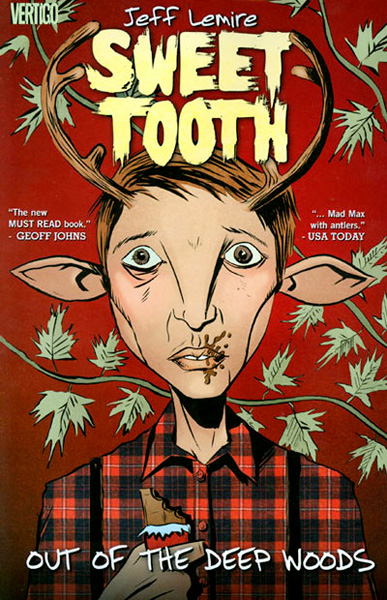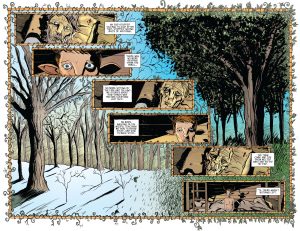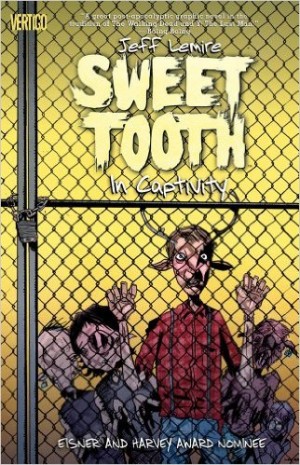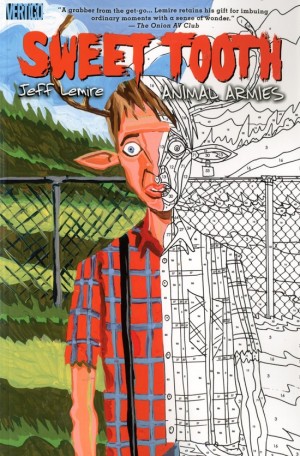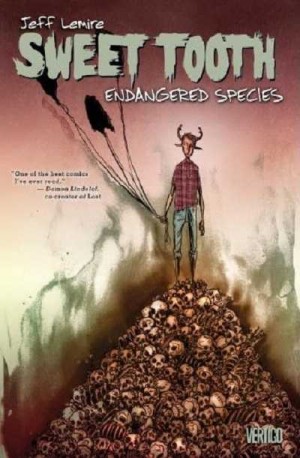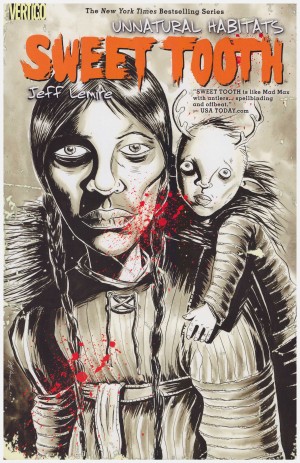Review by Karl Verhoven
To those only familiar with his later superhero work or his previous Essex County material, Jeff Lemire and the Vertigo imprint may, at first, seem an uneasy mix. Yet a storyteller is a storyteller, so the same observant naturalism and sense of unease and loss Lemire brought to his earlier work is present and correct in Sweet Tooth.
‘Sweet Tooth’ is the name given to Gus by the hunter that finds him, Jeppard, based on a love of chocolate bars. Gus has led a sheltered life in the backwoods alone with his father, a decade after a disease wiped out most of humanity, after which all new born babies are a form of animal hybrid. Gus is among them, possessing the intelligence of an average ten year old boy, but with facial features resembling a deer, and accompanying antlers. Living in isolation with a father he doesn’t realise has been less than stable leaves Gus with some odd ideas about the world and his surroundings. “Outside the trees is fire and hell, so we’s gotta stay here where it’s safe. Says the trees stop the fire from burning us forever, an’ if we wait here and pray hard one day we’ll get to go up to heaven and be with Mom. That’s what Dad says.”
There comes a time, though, when Gus has to venture out of the woods, and while the dangers might not correspond with his father’s instructions, they’re very real.
Much of this opening volume to a six book story is populated by just two characters, Gus and Jeppard. They’re an odd pair, yet mutually beneficial company, with Jeppard adapting to the survivalist culture that characterises the new world, and Gus’ design no coincidence as he reflects a wide-eyed curiosity and innocence. Part of Lemire’s appeal is a languid approach in which much is said without words, often over several pages, creating an atmosphere far better appreciated as part of a collection than in what were surely frustrating individually serialised comics.
Lemire’s scratchy, craggy art won’t hold universal appeal, and, quite wrongly, may appear crude, but once the story sucks you in, you won’t imagine anyone else drawing it. Apocalyptic fiction has experienced a relatively high profile in recent years, even discounting the zombie sub-genre, and Vertigo’s blurb writers mention The Road. Sweet Tooth is actually far more interesting, although equally spartan in its own way.
Answers are few here, but by the concluding pages it’s apparent exactly how Lemire slots into Vertigo’s world of horror and darkness. It continues with In Captivity, and both volumes are now united in Sweet Tooth Deluxe Edition volume one.
